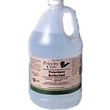Pronunciation
Deye-oc-til SO-dee-um Sul-fo-SUK-si-nate - Pronunciation guide
Brand Names
- Dioctynate
Description
Dioctyl sodium sulfosuccinate, or DSS, works as a stool softener or laxative by reducing the surface tension of the impaction and permitting water to penetrate and soften the fecal mass. It increases intestinal secretions and intestinal motility, aiding in its action.
Usage
Dioctyl sodium sulfosuccinate is used to treat horses with fecal impaction and foals with meconium impaction. The treatment varies with the location in the gastrointestinal tract and the severity of the impaction.
Dosage and Administration
| Dioctyl Sodium Sulfosuccinate | ||||
|---|---|---|---|---|
| Method | Dosage (click row for calculator) |
Concentration | Period | Duration |
| Enema | 4-6 oz1 | 5% | Every 48 hours | 2 times |
| Oral | 8 oz2 | 5% | Every 48 hours | 2 times |
Notes:
|
||||
Side Effects
Dioctyl sodium sulfosuccinate can cause diarrhea and abdominal pain.
Precautions
Excess fluid accumulation or gastric reflux should be ruled out before oral administration of DSS because the horse may not be able to propel the fluid forward and may be accumulating excess fluid in the stomach or small intestine.
Because of the secretory effects that high doses can produce, hydration and electrolyte status should be carefully monitored and treated when necessary.
DSS is sold only to veterinarians, and only a licensed veterinarian should perform nasogastric tubing.
No information is found regarding use in competition horses.
Interactions
DSS should not be administered at the same time as mineral oil because its effectiveness may be compromised.
Overdose
Higher doses of dioctyl sodium sulfosuccinate can cause severe diarrhea and increase abdominal pain.
Images
 Dioctyl Sodium Sulfosuccinate Liquid
Dioctyl Sodium Sulfosuccinate Liquid
Literature
